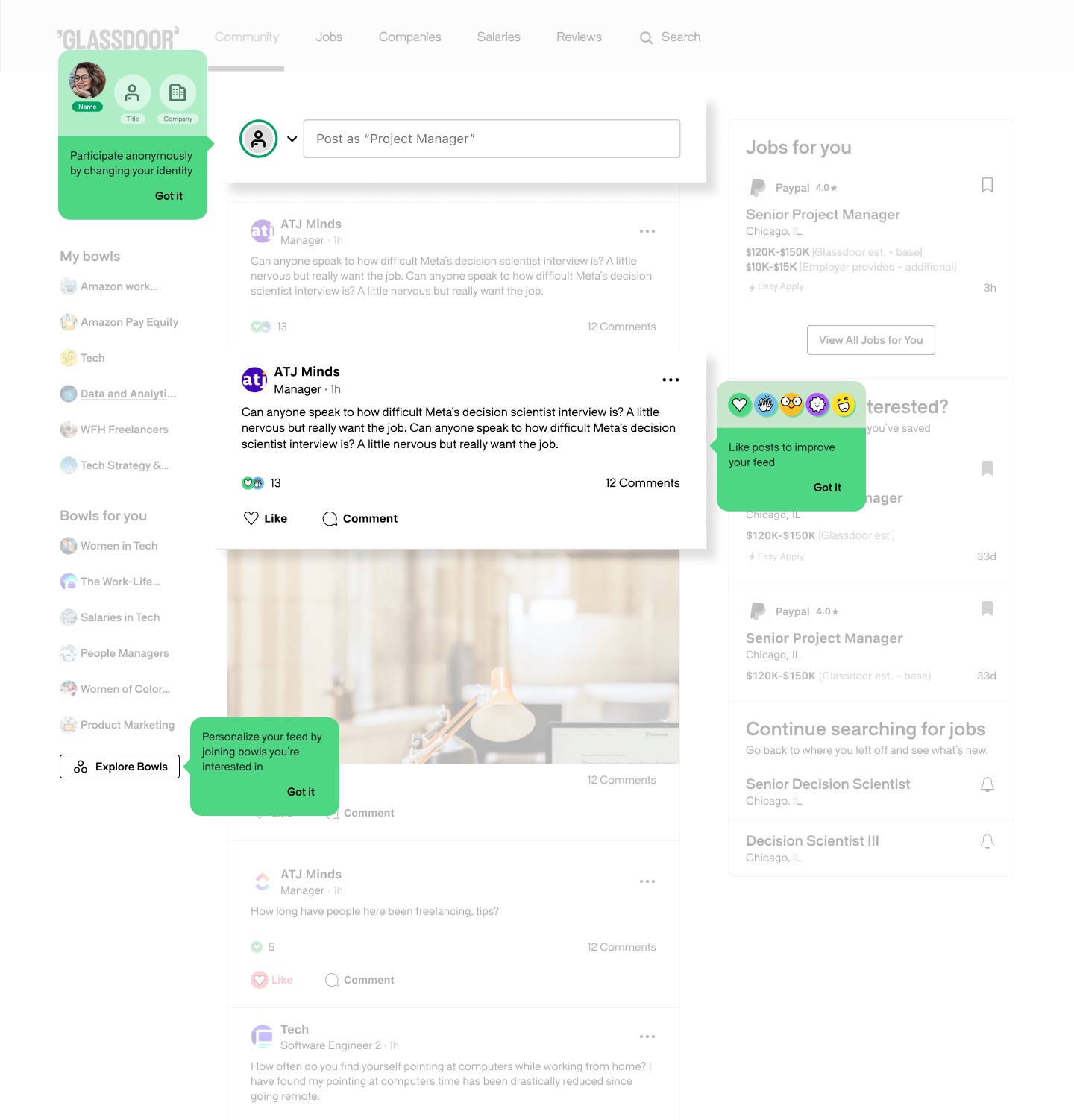Glassdoor, the platform known for anonymous salary and workplace reviews, is now introducing Blind-like community features for anonymous posting to fuel user growth. The company is leveraging its Fishbowl acquisition made in 2021 to port over features like interest bowls (interest-based communities) and company bowls. Glassdoor is also refreshing its branding with this launch.
The company is taking this step to bump up its active user base of 55 million — which has stayed at the same level for nearly two years.
Glassdoor is introducing the communities feature — where users can post anonymously — to facilitate conversation based on interests, roles and industry verticals. Users can choose to reveal part of their identity like job title and the organization they are working for while posting. The company has been testing these functions with a select set of users over the month. Now, it is rolling it out to all Glassdoor users across the web and mobile apps.

Image Credits: Glassdoor
With this migration, Glassdoor is also porting over 10,000 interest bowls and 30,000 company-specific bowls — where a company’s verified employees can chat about the workplace — from Fishbowl.
At the moment, Glassdoor automatically creates a company bowl when they see a significant number of employees of one organization on the platform. The company’s CEO Christian Sutherland-Wong said that the headcount threshold for creating a company bowl is not fixed. He noted that this feature is a “game changer” in learning about “employee sentiment” in real time.
Sutherland-Wong told TechCrunch over a call that at the moment Fishbowl will remain active as a product despite most of the features and conversations appearing on Glassdoor.
Sutherland-Wong also mentioned that, over the last few years and because of the pandemic, there is a need for a conversational platform focused on workplaces. So they decided to acquire Fishbowl and work toward moving its features and community to Glassdoor.
“What we’ve seen the last three years — and particularly in the post-COVID world — is that the workplace experience has fundamentally changed. People are more distributed than ever. And you hear people feeling lonely, disconnected from their office and their colleagues,” he said.

Example of bowls on Glassdoor community Image Credits: Glassdoor
The company conducted a survey by The Harris Poll to find that 68% of U.S. workers wanted an anonymous forum to ask questions to co-workers and leaders within the company. Sutherland-Wong added that one of the reasons for launching the conversational platform was that there was not much to do on Glassdoor for users apart from when they were posting a review or looking for potential companies for jobs.
In 2021, the anonymous workplace conversation app Blind raised $37 million through investors like South Korea-based Mainstreet Investment along with Cisco Investments and Pavilion Capital. Reports suggest that the company said that the app has more than 8 million users on the platform.
Glassdoor has a comparatively larger user base which it would like to grow. It would like to attract some of Blind’s users to its own community platform as well. The company said that, while it wants to protect anonymity, it wants to differentiate its conversational product by creating a “constructive space.”
Given that Glassdoor is introducing a text-based platform, it will face moderation challenges like other social networks. At the moment, the company uses both human and machine-learning-based moderation, but it plans to build more tools, like involving community moderators.
Sutherland-Wong said that the company doesn’t want to monetize the communities feature just yet. He said that Glassdoor’s main revenue stream remains ad spots for jobs, brand promotion and connecting companies to potential employees. However, the company also mentioned that it wants to build features on top of company bowls to help companies get insights about employee feedback. There might be some premium features on the discussion forum in the future.
Glassdoor’s biggest competitor in the professional network space is LinkedIn, which has more than 900 million active users and new features like AI-powered tools for posts and ad copies and verification for job posts.
Sutherland-Wong thinks that LinkedIn focuses on building someone’s identity and Glassdoor gives people the ability to be anonymous. He said that this makes the conversation happening on Glassdoor “real talk.” Earlier this year, Glassdoor let go of 140 people — almost 15% of its workforce.
